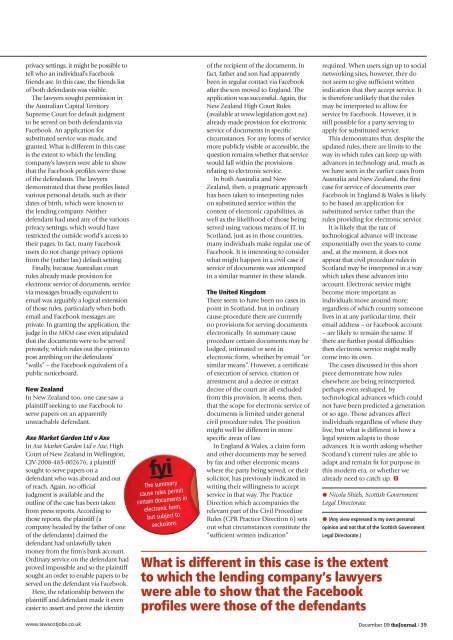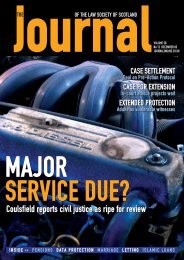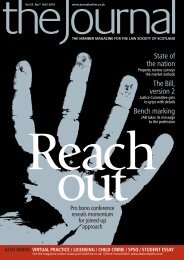Professional briefing - The Journal Online
Professional briefing - The Journal Online
Professional briefing - The Journal Online
You also want an ePaper? Increase the reach of your titles
YUMPU automatically turns print PDFs into web optimized ePapers that Google loves.
privacy settings, it might be possible to<br />
tell who an individual’s Facebook<br />
friends are. In this case, the friends list<br />
of both defendants was visible.<br />
<strong>The</strong> lawyers sought permission in<br />
the Australian Capital Territory<br />
Supreme Court for default judgment<br />
to be served on both defendants via<br />
Facebook. An application for<br />
substituted service was made, and<br />
granted. What is different in this case<br />
is the extent to which the lending<br />
company’s lawyers were able to show<br />
that the Facebook profiles were those<br />
of the defendants. <strong>The</strong> lawyers<br />
demonstrated that these profiles listed<br />
various personal details, such as their<br />
dates of birth, which were known to<br />
the lending company. Neither<br />
defendant had used any of the various<br />
privacy settings, which would have<br />
restricted the outside world’s access to<br />
their pages. In fact, many Facebook<br />
users do not change privacy options<br />
from the (rather lax) default setting.<br />
Finally, because Australian court<br />
rules already made provision for<br />
electronic service of documents, service<br />
via messages broadly equivalent to<br />
email was arguably a logical extension<br />
of those rules, particularly when both<br />
email and Facebook messages are<br />
private. In granting the application, the<br />
judge in the MKM case even stipulated<br />
that the documents were to be served<br />
privately, which rules out the option to<br />
post anything on the defendants’<br />
“walls” – the Facebook equivalent of a<br />
public noticeboard.<br />
New Zealand<br />
In New Zealand too, one case saw a<br />
plaintiff seeking to use Facebook to<br />
serve papers on an apparently<br />
unreachable defendant.<br />
Axe Market Garden Ltd v Axe<br />
In Axe Market Garden Ltd v Axe, High<br />
Court of New Zealand in Wellington,<br />
CIV-2008-485-002676, a plaintiff<br />
sought to serve papers on a<br />
defendant who was abroad and out<br />
of reach. Again, no official<br />
judgment is available and the<br />
outline of the case has been taken<br />
from press reports. According to<br />
those reports, the plaintiff (a<br />
company headed by the father of one<br />
of the defendants) claimed the<br />
defendant had unlawfully taken<br />
money from the firm’s bank account.<br />
Ordinary service on the defendant had<br />
proved impossible and so the plaintiff<br />
sought an order to enable papers to be<br />
served on the defendant via Facebook.<br />
Here, the relationship between the<br />
plaintiff and defendant made it even<br />
easier to assert and prove the identity<br />
www.lawscotjobs.co.uk<br />
fyi<br />
<strong>The</strong> summary<br />
cause rules permit<br />
certain documents in<br />
electronic form,<br />
but subject to<br />
exclusions<br />
of the recipient of the documents. In<br />
fact, father and son had apparently<br />
been in regular contact via Facebook<br />
after the son moved to England. <strong>The</strong><br />
application was successful. Again, the<br />
New Zealand High Court Rules<br />
(available at www.legislation.govt.nz)<br />
already made provision for electronic<br />
service of documents in specific<br />
circumstances. For any forms of service<br />
more publicly visible or accessible, the<br />
question remains whether that service<br />
would fall within the provisions<br />
relating to electronic service.<br />
In both Australia and New<br />
Zealand, then, a pragmatic approach<br />
has been taken to interpreting rules<br />
on substituted service within the<br />
context of electronic capabilities, as<br />
well as the likelihood of those being<br />
served using various means of IT. In<br />
Scotland, just as in those countries,<br />
many individuals make regular use of<br />
Facebook. It is interesting to consider<br />
what might happen in a civil case if<br />
service of documents was attempted<br />
in a similar manner in these islands.<br />
<strong>The</strong> United Kingdom<br />
<strong>The</strong>re seem to have been no cases in<br />
point in Scotland, but in ordinary<br />
cause procedure there are currently<br />
no provisions for serving documents<br />
electronically. In summary cause<br />
procedure certain documents may be<br />
lodged, intimated or sent in<br />
electronic form, whether by email “or<br />
similar means”. However, a certificate<br />
of execution of service, citation or<br />
arrestment and a decree or extract<br />
decree of the court are all excluded<br />
from this provision. It seems, then,<br />
that the scope for electronic service of<br />
documents is limited under general<br />
civil procedure rules. <strong>The</strong> position<br />
might well be different in more<br />
specific areas of law.<br />
In England & Wales, a claim form<br />
and other documents may be served<br />
by fax and other electronic means<br />
where the party being served, or their<br />
solicitor, has previously indicated in<br />
writing their willingness to accept<br />
service in that way. <strong>The</strong> Practice<br />
Direction which accompanies the<br />
relevant part of the Civil Procedure<br />
Rules (CPR Practice Direction 6) sets<br />
out what circumstances constitute the<br />
“sufficient written indication”<br />
required. When users sign up to social<br />
networking sites, however, they do<br />
not seem to give sufficient written<br />
indication that they accept service. It<br />
is therefore unlikely that the rules<br />
may be interpreted to allow for<br />
service by Facebook. However, it is<br />
still possible for a party serving to<br />
apply for substituted service.<br />
This demonstrates that, despite the<br />
updated rules, there are limits to the<br />
way in which rules can keep up with<br />
advances in technology and, much as<br />
we have seen in the earlier cases from<br />
Australia and New Zealand, the first<br />
case for service of documents over<br />
Facebook in England & Wales is likely<br />
to be based an application for<br />
substituted service rather than the<br />
rules providing for electronic service.<br />
It is likely that the rate of<br />
technological advance will increase<br />
exponentially over the years to come<br />
and, at the moment, it does not<br />
appear that civil procedure rules in<br />
Scotland may be interpreted in a way<br />
which takes these advances into<br />
account. Electronic service might<br />
become more important as<br />
individuals move around more:<br />
regardless of which country someone<br />
lives in at any particular time, their<br />
email address – or Facebook account<br />
– are likely to remain the same. If<br />
there are further postal difficulties<br />
then electronic service might really<br />
come into its own.<br />
<strong>The</strong> cases discussed in this short<br />
piece demonstrate how rules<br />
elsewhere are being reinterpreted,<br />
perhaps even reshaped, by<br />
technological advances which could<br />
not have been predicted a generation<br />
or so ago. Those advances affect<br />
individuals regardless of where they<br />
live, but what is different is how a<br />
legal system adapts to those<br />
advances. It is worth asking whether<br />
Scotland’s current rules are able to<br />
adapt and remain fit for purpose in<br />
this modern era, or whether we<br />
already need to catch up.<br />
Nicola Shiels, Scottish Government<br />
Legal Directorate.<br />
(Any view expressed is my own personal<br />
opinion and not that of the Scottish Government<br />
Legal Directorate.)<br />
What is different in this case is the extent<br />
to which the lending company’s lawyers<br />
were able to show that the Facebook<br />
profiles were those of the defendants<br />
December 09 the<strong>Journal</strong> / 39










